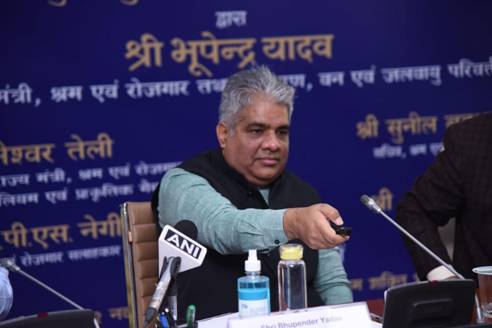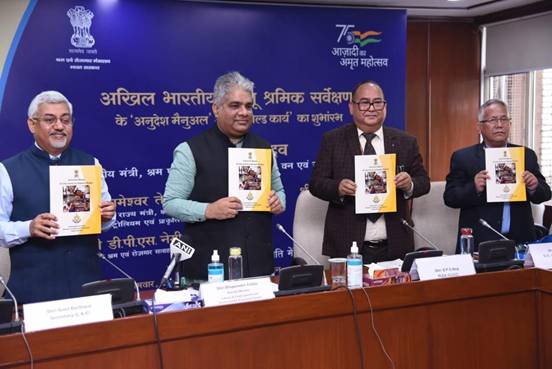- All India Surveys currently underway and the E-shram portal will be game changer and set new standards in data driven policies

On the occasion, Yadav also released instruction manual with questionnaire for All India Survey on Domestic workers, which will cover 37states/UT’s and 742 Districts across the length and breadth of the country.

Speaking on this occasion,the Union Minister said that this is for the first time in Independent India that such Nationwide survey is being conducted and this shows the commitment of government towards having an evidence based, data driven policy which will help in targeted and last mile delivery of services &achieve the goal of “Sabka Sath Sabka Vikas, Sabka Viswas” under the leadership of Prime Minister Narendra Modi. The Minister further stated that all these All India Surveys &the e-shram portal will be game changer & have set New standards in data driven Policies.
Rameshwar Teli, Union Minister of State for Labour & employment, in his message during the launch said that the survey is a momentous step and congratulated the officials of the Ministry and Labour Bureau. The event was also attended by Sunil Barthwal, Secretary (L&E), D.P.S. Negi, Principal Labour & Employment Advisor & Chief Labour Commissioner (Central), I.S. Negi, Director General, Labour Bureau & other senior officers of Ministry of Labour & Employment.
The All India Survey on Domestic Workers is aimed to estimate the number and proportion of domestic workers at National and State level, percentage distribution of domestic workers with respect to Live-in/Live-out, formal/ Informal Employment, Migrant/Non-Migrant, their wages and other socio-economic characteristics.
The survey will also provide the Household Estimates of Live-in/Live-out domestic workers and average number of domestic workers engaged by different types of households. the main objective are:
- Estimate the number/proportion of DWs at National and State level.
- Household Estimates of Live-in/ Live-out DWs.
- Average number of DWs engaged by different types of households.
The Domestic Worker Survey collects information on the following broad parameters:
• Household Characteristics such as HH size, Religion, Social Group, Usual Monthly Consumption Expenditure, Nature of Dwelling unit.
• Demographic Characteristics such as Name, Age, Relation to Head, Marital Status, General Education Level, Usual Principal Activity Status, Subsidiary Activity Status and Status of DWs.
• In addition to this, it also collects information on DWs such as their Age of entry, Social Group, Migrant status, Vocational Training/Education, Number of HHs served by DW, activities performed by them, and number of days worked, Duration of work, Type of remuneration and its frequency, Type of contract, Distance travelled, Engagement as DW before and after COVID-19 pandemic and its effect on wages and job, living conditions and social security benefits received.
• Information on Employer HHs is also collected such as their preferences of DW regarding Gender and marital status, mode of payment of wages, number of days worked, mode of engagement, whether DW services were availed during ii COVID-19 pandemic, medical support given to DWs.
Scope of the Survey:
- All India States/UTs of India covered are 37 and Districts covered are742
- Unit of Enumeration is Villages as per Census 2011 and Urban Blocks as per latest phase of UFS.
- At the all-India level, a total number of 12766 First Stage Units (FSUs) i.e., 6190 villages and 6576 UFS blocks will be covered in the survey.
- 1,50,000 Households i.e., the Ultimate Stage Units (USU) will be covered.
The result of the All-India Survey on Domestic Workers is expected within a time-span of 1 year.
